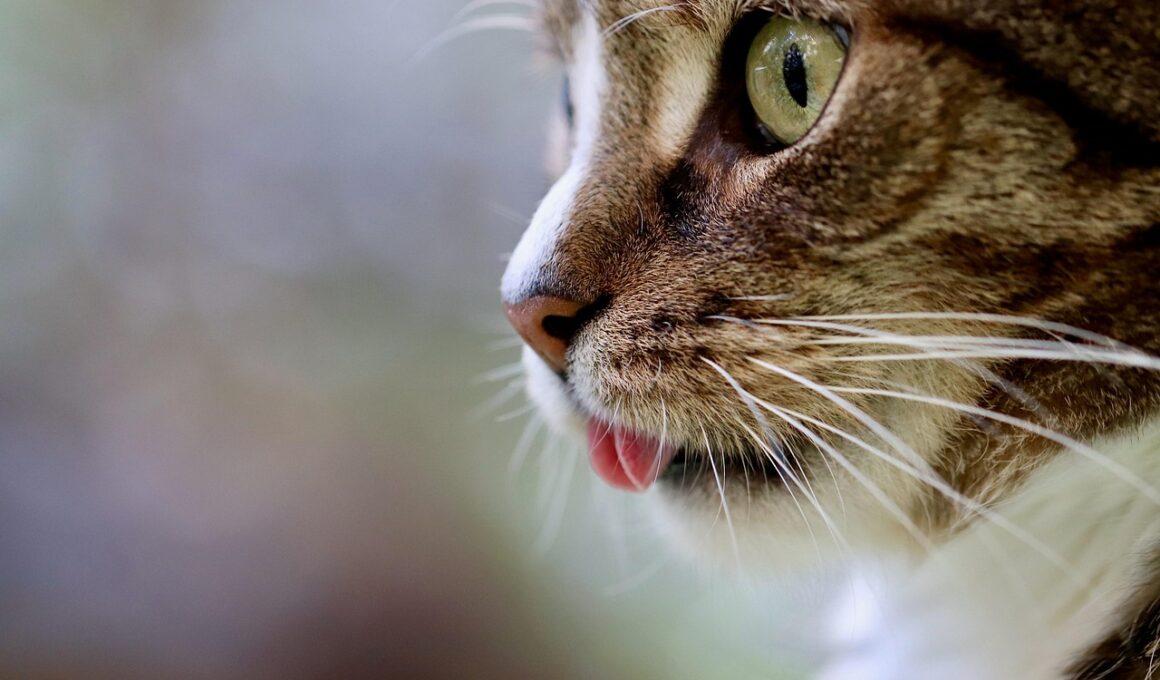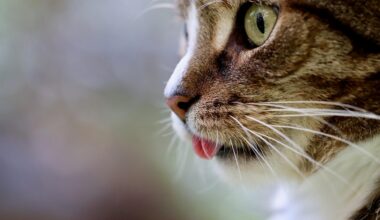Understanding Fiber and Vitamin Combinations for Feline Digestive Care
Digestive health is critical for maintaining your cat’s overall well-being, and ensuring they receive adequate fiber and vitamins is essential. Fiber plays a significant role in promoting healthy digestion by enhancing the movement of food through the digestive tract. Cat vitamins complement this function by supplying necessary nutrients tailored to feline needs. A balanced diet that includes both fiber-rich components and vitamin supplements can lead to improved gastrointestinal function. Common sources of dietary fiber for cats include pumpkin, psyllium husk, and green beans. These sources help control hairballs and prevent constipation. On the vitamin side, look for those specifically designed for cats, containing vitamins A, B, E, and K, as these contribute to better gut health. They help strengthen the immune system that protects against infections that could disrupt digestion. Owners should consult their veterinarians before introducing any supplements. This ensures the selected vitamins and fiber sources are appropriate for their cat’s specific health requirements. Watch for changes in litter box behavior, which can signal if your feline requires adjustments to their diet or supplementation. Bringing these elements together fosters a happier, healthier cat.
The Role of Fiber in Feline Diets
Fiber is an important element in cat nutrition, influencing digestive efficiency and promoting regular bowel movements. Incorporating fiber into your cat’s diet can prevent gastrointestinal issues such as constipation and diarrhea. It also assists in controlling hairballs, which can be a common problem for cats, especially those that groom themselves frequently. Including fiber-rich foods like cooked pumpkins, leafy greens, and specially formulated cat food can help boost your cat’s fiber intake. Offering small amounts of bran, oats, or flaxseed can also enhance the fiber content of your cat’s diet. Additionally, it’s important to select the right type of fiber. There are two types of fiber: soluble and insoluble. Soluble fiber slows digestion, while insoluble fiber adds bulk to stools. A balanced approach by mixing both types can yield optimal results. Always introduce new fiber sources gradually to your cat’s diet to prevent digestive upset. Monitor your pet’s stool and overall health to determine how well they adapt. Educating yourself on the various fiber types and sources available can significantly impact your cat’s health, making it a worthy endeavor to invest in their future care.
The importance of vitamins in your cat’s dietary regimen cannot be understated. They play crucial roles in myriad bodily functions, including digestion. Specific vitamins aid in ensuring your cat’s digestive system remains efficient and functional. For example, Vitamin B complex contributes significantly to metabolism and efficient energy extraction from food. Similarly, Vitamin A supports maintaining healthy epithelial tissue in the digestive tract, promoting proper nutrient absorption. While a balanced diet may provide most vitamins, some cats may require additional supplements, especially as they age, due to decreased absorption rates. Before adding any supplements, it’s critical to consult with a veterinarian. They can assess your cat’s diet and determine any deficiencies or excesses. Moreover, supplements should be chosen with caution, ensuring they are specifically formulated for feline needs. Some human vitamins are toxic to cats. An appropriate balance of vitamins helps maintain overall health while striving for optimal digestive performance. Observing your cat’s health and energy levels can indicate how well the vitamins are working. Regular veterinary check-ups are vital to ensure your cat’s nutritional needs are met throughout different life stages.
Combining Vitamins and Fiber Effectively
Utilizing fiber and vitamins together boosts their individual effects on your cat’s digestive health. The combination helps create a healthier gastrointestinal environment, facilitating better nutrient absorption. When considering the best combinations, look for foods that incorporate both components. Many commercial cat food brands now include balanced ratios, making it easier for pet owners. However, homemade diets can also be tailored to include fiber sources like pumpkin mixed with a vitamin supplement. A thoughtful mixture of chicken or fish with vegetables provides both proteins and fibers, optimizing the overall diet. Remember, the natural sources should be weighted more heavily than synthetic ones; obtain vitamins naturally through diet when possible. Always introduce new foods gradually to prevent digestive upset in your cat. It is also worth exploring probiotic supplements, as they complement fiber and vitamin intake by promoting a healthy gut flora. Regular consumption helps ensure your pet has balanced digestive habits and promotes effective breakdown of their meals. Just like with any other dietary change, keep a close eye on any reactions or changes in health. Tracking your cat’s response will guide you in fine-tuning their diet.
Hydration is another critical component of maintaining digestive health in felines. Cats can be prone to dehydration, which can exacerbate digestive issues. Including wet food in their diet can ensure they consume adequate moisture. Wet cat food not only helps with water intake but often combines fiber and vitamins, which supports digestive health. Additionally, ensure your cat has access to clean, fresh water at all times. Some cats may prefer running water from pet water fountains, so consider investing in one if your cat seems less inclined to drink. Ensuring hydration can soften stools and help prevent constipation. Watch your cat’s urination habits, and if there are notable changes, consult with a veterinarian promptly. Dehydration can lead to serious complications, not only in digestion but in overall health as well. Whether providing water-rich foods or ensuring fresh water is always available, the goal is to support proper digestion and nutrient absorption. Optimizing hydration alongside diet will result in happier, healthier, and more energetic cats while also significantly reducing the risk of digestive distress.
Identifying Digestive Issues in Cats
Cats can be quite stoic, often hiding their discomfort or pain, making it crucial for pet owners to learn to identify signs of potential digestive issues. Common signs may include vomiting, constipation, diarrhea, or decreased appetite. If your cat begins exhibiting any unusual behavior related to digestion, it is crucial to investigate the issue promptly. Changes in litter box habits or stool consistency can also signal disturbances in the digestive tract. Keep in mind that some issues may be linked to dietary changes or new supplements. Monitoring your cat’s health closely is key, especially when introducing any new foods. Regular veterinary check-ups can help catch issues early, as a veterinarian will assess your cat’s weight, body condition, and overall health. Appropriate diet adjustments, potentially including increased fiber or specific vitamins, may greatly improve your cat’s digestive health. If symptoms persist or worsen, seek immediate veterinary care. Being proactive can avoid potential complications linked to untreated digestive issues, leading to a healthier feline. Understanding these signals will facilitate better care and quicker resolutions to any underlying problems.
In conclusion, maintaining a balanced approach to your cat’s diet with proper fibers and vitamins is essential for optimal digestive health. These components work best together, promoting effective digestion and nutrient absorption. Selecting high-quality commercial foods or well-researched homemade diets will significantly enhance your cat’s digestive system and overall health. Ensure regular monitoring of your cat’s health and adjustments to their diet as necessary. Stay informed about the types of fibers and vitamins beneficial to felines, thereby empowering yourself to make the best choices for your furry friend. Consult with your veterinarian to tailor a dietary plan suited specifically for your cat’s unique needs, especially regarding existing health conditions or age. Over time, your commitment to understanding and optimizing your cat’s nutrition will result in improved well-being. Healthier digestion manifests in happiness and vitality, so prioritize their nutritional needs with care. Being attentive to any changes and maintaining a proactive approach promotes a long and healthy life for your cat. This pursuit of dietary excellence will undoubtedly lead to a stronger bond with your feline companion.
In conclusion, maintaining a balanced approach to your cat’s diet with proper fibers and vitamins is essential for optimal digestive health. These components work best together, promoting effective digestion and nutrient absorption. Selecting high-quality commercial foods or well-researched homemade diets will significantly enhance your cat’s digestive system and overall health. Ensure regular monitoring of your cat’s health and adjustments to their diet as necessary. Stay informed about the types of fibers and vitamins beneficial to felines, thereby empowering yourself to make the best choices for your furry friend. Consult with your veterinarian to tailor a dietary plan suited specifically for your cat’s unique needs, especially regarding existing health conditions or age. Over time, your commitment to understanding and optimizing your cat’s nutrition will result in improved well-being. Healthier digestion manifests in happiness and vitality, so prioritize their nutritional needs with care. Being attentive to any changes and maintaining a proactive approach promotes a long and healthy life for your cat. This pursuit of dietary excellence will undoubtedly lead to a stronger bond with your feline companion.


